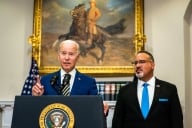You have /5 articles left.
Sign up for a free account or log in.
Timothy White, president of the University of Idaho, is among a growing list of 300-plus institution leaders to sign the American College and University Presidents Climate Commitment, a much-publicized effort through which campuses pledge to eventually become climate neutral.
White also has promised to mitigate the university’s effect on global warming through membership in the Chicago Climate Exchange. And there, his academic company is far more limited. Only the Universities of Iowa, Minnesota and Oklahoma; Michigan State and Tufts Universities; and Hadlow College in Britain -- have agreed through this effort to reduce their carbon emissions over the next several years.
While both programs are voluntary and signal the recent interest among colleges in the green movement, they are markedly different in design and function. The Climate Commitment, unveiled last year, is jointly coordinated by nonprofit groups and an association whose focus is sustainability in higher education. Colleges set their own short-term goals for reducing their carbon footprint and self-report their greenhouse gas emissions. There is no penalty -- other than shame, commitment leaders say -- if colleges fall short of their targets.
The Climate Exchange, a financial institution, is a greenhouse gas emissions allowance trading system. Members agree to carbon reduction benchmarks and undergo outside audits that track energy purchases and consumption. They are legally bound to their pledge and suffer (or gain) financially based on their outcomes.
College officials who are monitoring their institutions' involvement in the exchange said that an investment in this market shows to students, faculty and employees a long-term commitment to going green. They also said that the decision to join was made somewhat easier by the fact that their administrations or state legislatures were already far along toward mandating the type of carbon reductions that are required.
"This fits with what we're already doing, and it should be easy to get to where we need to be in terms of reductions," said Jack Morris, dean of Idaho's College of Business and Economics. "The main reason we're doing this is to understand how this market-based mechanism will help in reducing carbon emissions. It gives us a chance to take the lead in developing the intellectual capital to mange this problem."
The idea of a market-based solution to greenhouse gas reduction has been gaining traction. For instance, the British government just floated a proposal for an auction-based carbon emissions allowance program for universities, among other groups.
Chicago Climate Exchange's members also include municipalities, state governments, businesses and other organizations. In the free-market system, participants buy or amass carbon credits based on whether they emit over or under the set target. Those who meet or beat the annual goal for reduction bank credits; those who fall short essentially pay another member who is ahead to work on its carbon-reducing project. The price of a share of carbon credit has risen more than three-fold since the first market price was set.
The idea behind the exchange is that by having financial obligations, participating institutions have greater incentives to think up ways to reduce their carbon footprint and will make meeting their targets on time a priority. Each member has something different to offer the market. Oklahoma has committed to purchasing wind power-generated electricity. Iowa's sustainability project involves the use of biomass fuel.
To meet its targets, Idaho is considering replacing its current fleet of vehicles with fuel-efficient models and purchasing or generating a portion of electricity consumption from renewable sources. The university is mulling its offset options, such as agricultural methane collection and combustion at livestock operations and contracts for forest carbon sequestration.
Colleges have different targets based on when they joined. For instance, Iowa entered in 2004, and it had to reduce direct greenhouse gas emissions 4 percent below its baseline (average of 1998-2001 emissions) by the end of last December. In order to meet that goal, the university bought 2,000 tons of carbon credits from Iowa farmers. Idaho, which joined this year, is being asked to reduce emissions 6 percent below its baseline by 2012.
Morris, of Idaho, said students in his academic department should be familiar with trading mechanisms and alternatives to putting carbon dioxide in the air.
“We don’t view this as a way for the university to make money,” Morris said. “We certainly hope we are able to reduce more than the set amount and thus be supplying certificates, but it's an educational initiative as much as anything else."
Robert Elde, dean of the College of Biological Sciences at Minnesota and chair of the executive committee of its Initiative for Renewable Energy and the Environment, said the university finished its first year ahead on credits, meaning it would have been able to cash in for about $600,000. (It has no plans to do so.) Beyond finances, he said the university is interested in researching which projects in the market work for members and which don't.
Ferman Milster, associate director of utilities and energy management at Iowa, said the college has exceeded its target each year because of its biofuel program that helps displace carbon-producing coal. Faculty who specialize in related fields are being used to guide the projects there, he said.
The Climate Exchange is expecting more interest from colleges as the market continues to expand. Milster said he suspects some colleges are tentative to join because of the annual measurements and the financial repercussions that come from falling short.
"That's one of the things that caused us consternation, and it took awhile to digest what membership would mean," Milster said. "There's a lot of pressure on colleges to get involved in some way. In this case, if you aren't already on track [toward immediate reduction], you should be prepared to pay."








